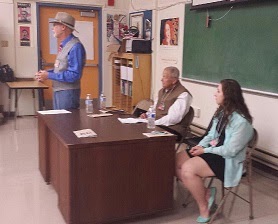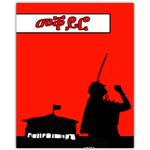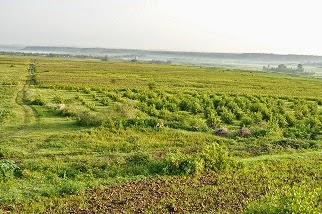Tuesday, November 25, 2014
Right Place, Wrong Reasons: Discovering a Rare Sound Recording from Eritrea
Hoover Institution posted a rare sound recording.
Check out the link below:
http://www.hoover.org/research/right-place-wrong-reasons-discovering-rare-sound-recording-eritrea
Saturday, November 8, 2014
Guest Writers
Reflections on the Western U.S.A. Eritrea Festival 2014
Dr. Samuel Mahaffy
I came to the Western U.S.A. Eritrea Festival 2014 as an invited guest. I left as a family member being in the company of sisters and brothers from Eritrea, our shared distant homeland. The invitation to present as a speaker at the Festival surprised and delighted me. Yes, I have been public in my deep
appreciation of the Eritrean people and culture. And, I have been relentless in maintaining that the invisiblization of Eritrea in the West—especially in the U.S.—is ill-conceived and unjust. Still, I came to the Festival as one of ‘The Other Eritreans.’ I was joined by Emilio DeLuigi, a delightful and distinguished Canadian-Italian gentleman and author of the book Ninety-Three Days: A Journey to Freedom. Between us on the panel, like a rose between two old thorns was Emilio’s articulate granddaughter, Elena. Our panel was moderated by Issayas Tesfamariam. Issayas’ remarks in a post-Festival communication to both Emilio and I mark the warmth of the relationships we deepened with Eritreans in Oakland. He notes that we are now accepted as The Other Eritreans with
‘no parenthesis.’ There was no bracketing of our experience of Eritrea because of our different heritage. It is reflective of the beautiful inclusiveness of Eritreans and their exquisite ability to warmly welcome others. We were fully accepted as part of the Eritrean family. I share here—in addition to my deep appreciation of this experience—what I learned at the Festival about Eritrea—its past and its future.
Mr. Emilio De Luigi, Dr. Samuel Mahaffy and Elena De Luigi.
Eritrea is often spoken of in terms of three distinct historical periods—pre-liberation, the struggle for Independence, and post-liberation. This differentiation unfortunately tends to minimize what has been consistently true of Eritrea and the Eritrean people over the decades and centuries.
From his first-hand experience of escaping out of Ethiopia through Eritrea, escorted and assisted by Eritrean liberation fighters, Emilio De Luigi expresses well that the post-liberation Eritrea was already being shaped and built during the struggle for Independence. The battle for liberation and the evolving re-birth of a free and independent Eritrea charting its own course were one and the same struggle.
De Luigi notes that the organization of the Eritrean liberation fighters was not the recruitment of a military or mercenary force. It was an organic movement. This was a compelling call answered by the people of Eritrea to free their country from outside dominance. It reflected the yearning of a people for freedom, independence and a promising future.
It occurs to me that this is, in fact, the most significant aspect of the way in which the United States and some other Western governments miscalculate in regard to Eritrea. Eritrea is here to stay precisely because it is not first a military organization now ruling a country. It is first of all a people fiercely independent and determined to build their own future. The Eritrea that never kneeled down to oppressors and against all odds won its costly struggle for independence is the same Eritrea that will never kneel down before an outside hegemonic agenda of dominance over its own development priorities.
“The legacy of the Eritrean freedom fighters was equality", De Luigi spoke this from his first-hand experience of traveling in the company of Eritrean liberation fighters on nighttime trails twisting through the highland mountains of Eritrea. He recalls a captured Ethiopian soldier joining him and the Eritrean liberation fighters in eating from a common dish. Rations of food were shared equally among the liberation fighters, their captured opposition fighter and their escorted guest.
Eritrea was already being shaped as a future society through the struggle for liberation. That shaping encompassed a vision for equality and respect for differences. Eritrean people of the Moslem faith and the Orthodox Christian faith, who once fought side-by-side for independence, now have houses of worship in the capital city of Asmara standing in sight of each other. Within a distance of less than two kilometers can be found a Moslem mosque, an Orthodox Christian church, a Catholic church, a Jewish synagogue and an Evangelical Lutheran church.
Many years after the struggle for Independence, the celebration of that great achievement still resonates and vibrates through the Western U.S.A. Eritrean Festival. It is a shared story that crosses generational lines and defines a spirit of both resiliency and joy so evident at the Festival. There is also evidence of a cautious guardedness. The struggle for liberation received little support from the outside world. The invisiblization of Eritrea and the unwillingness of other countries to embrace its hard-earned independence has left wounded relationships. The healing of these relationships will surely require mutual respect and patience.
Sunday, August 10, 2014
A Conservation with Dr. Samuel Mahaffy
Dr. Samuel Mahaffy
Issayas: Would you tell us about yourself?
Dr. Samuel Mahaffy: I was born in Asmara, Eritrea and grew up in the town of Senafe. My family lived in Eritrea for around 27 years. I have four brothers and two sisters, all born and raised in Eritrea. I moved to the United States in 1966. The transition to life in the United States was very challenging for me. I still consider Eritrea my homeland. I have stayed connected to my Eritrean roots through being involved in nonprofit work with immigrant and refugee communities from Eritrea and other East African countries. Sharing my heritage from Eritrea has always been important to me. I reconnected in the U.S. with a wise Eritrean woman who taught me how to make injera when I was little. After lots of struggles, I became a bit proficient at fixing injera and the
traditional foods from Eritrea. I taught my three beautiful children to make injera. To honor the Eritrean people who have meant so much to me and to help correct misconceptions about Eritrea, I published a book called Eritrean Cooking: Rich Relationships and Recipes from East Africa.
I have been a nonprofit consultant most of my life and have worked with more than five hundred nonprofits and NGOs including a number in Africa. I value especially my relationship with Salaam Urban Village Association in Seattle, a nonprofit started by Eritreans and serving immigrant and refugee families. As part of my work with Salaam Urban Village, I hope to be part of a delegation visiting Eritrea in the months ahead. I earned my Master of Arts in Linguistics from the University of Michigan. My deep appreciation for language comes from my years in Eritrea. I received my PhD from Tilburg University in the Netherlands through the Taos Institute of which I am now an Associate. I have become a relentless advocate for sharing accurate information about Eritrea in the face of much mis-information.
Issayas: Why do you think there is mis-information about Eritrea? Or put differently, why is it important to tell "accurate information" about Eritrea?
Dr. Samuel Mahaffy: Ignorance about Eritrea in the U.S., is in large part endemic of an educational system here that has been ethno-centric and interpreted world history through the lens of predominate/dominate and Indo-European culture.We are sadly ignorant of the rich history, cultures and languages of the African continent. Beyond that, I concur with scholars such as Noam Chomsky that see a deliberate intent to either 'invisiblize' or inaccurately represent countries like Eritrea that do not fall into line with the U.S. and corporate economic, development and political agenda. There has been little tolerance for countries charting their own course. Eritrea has done so, since liberation, to a greater extent than most African countries and has paid a price in terms of isolation.
It is important to present accurate information about Eritrea in the interests of truth and in fairness to the people and Country of Eritrea. For there to be peace in the world, there must be dialogues across cultures and languages that are respectful and the dynamic of having 'power-over' others must change. I am convinced that Eritrea can be an important participant in creating peace and stability in the Horn of Africa.
I take personally misinformation about Eritrea, because Eritrea is very much part of who I am today.
Issayas: Would you tell us more about Salaam Urban Village Association?
Dr. Samuel Mahaffy: Salaam Urban Village Association is a nonprofit started in Seattle, Washington nearly seven years ago. It was founded by my Eritrean friend, Amanuel and several other Eritreans. The original motivation was a negative reaction of the Seattle community to a few young people from Eritrea and other East African countries who were getting into trouble in the City. There was a sense that both young people from African immigrant families needed more support and community connection to transit to life in the United States and that there were many misperceptions around the African community. SUVA has focused on supporting services for migrant/refugee families.
My involvement with SUVA started by writing successful grant applications for program services. We saw that, like many nonprofits, SUVA needed a more sustainable funding paradigm. Through a visioning process we called REIMAGINE SUVA we are reshaping the nonprofit to be a 'portal to Africa' supporting immigrant/refugee communities across the United States while still focusing on services in Seattle.
Issayas: You mentioned that you want "to honor the Eritrean people who have meant so much to me". Would you elaborate? What did they mean to you? Do they still mean so much to you now? Why?
Dr. Samuel Mahaffy: My relationships with the Eritrean people has shaped who I am today. I have lived in two worlds--that of the village of Senafe in Eritrea and large urban centers in the United States. I am struck that the Western world in which I now live is very driven by 'agendas.' This culture sets agendas of achieving certain levels of wealth, status, education. The agenda may be saving for retirement. As a culture, there has been an American agenda to be 'second to none' in the world in terms of economic prosperity and power. These are agendas that, when they are our priority, do not bring happiness in our lives.
Arlena Mahaffy (Dr. Samuel's mother) serves coffee
in Senafe, Eritrea many years ago.
The Eritrean culture that I know and that is part of who I am, prioritizes relationships over agenda. Eritrea, like many countries outside the United States has a much more relational culture. It is this relational spirit that causes many 'outsiders' who meet Eritreans, to deeply appreciate the people of Eritrea. I know the people of Eritrea to be a generous people. I cannot count the times that I have been invited to share a meal in an Eritrean restaurant or home. This is a spirit of sharing that I see as being critical if we are to survive and thrive as a global community. I call it "eating from a common dish." When we share a meal, break injera together, or exchange stories over tea, we are equals and honoring of that which makes us all human.
I believe the Western world has much to learn from the more relational cultures of Africa. In my peace making and conflict resolution work, I often pull on this wisdom from Africa generally and Eritrea in particular. I write regularly on these topics on my blog.
Beyond this broad perspective, there are so many Eritreans who have meant so much to me. There are the kids I played soccer with--many of my childhood friends lost in the costly war that Eritrea fought for liberation. A great teacher for me, was a wise Eritrean woman named Abrahet. I learned to make injera as a young child at her feet. I remember her care for me, the songs she sang to me in Tigrinya. I am happy that my twin daughters, at the age of six, had the opportunity to meet Abrahet in the United States, before she passed away.
I trust my Eritrean friends. I would trust my children to them in a minute.
Abrahet, who taught Samuel how to make injera,
with Dr. Samuel's twin daughters when they were little.
Issayas: You also mentioned that " to help correct misperceptions (misconceptions) about Eritrea, I published a book called Eritrean Cooking: Rich Relationships and Recipes from East Africa. Has the book done that? How do you measure that? For example, did people tell you, etc.?
I have always wanted to leave the story of my families experience in Eritrea as a legacy for my children. It helps them to understand who I am. My cookbook was a way to do that. It is also my way to present stories that reflect what the Eritrean people mean to me. While it provides just my
families tradition of fixing Eritrean food, the real 'recipes' are the stories about living a more relational and connected life. The book was only published last year, but has been well received. It has actually been nominated for a cookbook award this year. I am sure it will go through a number of revisions. Such is the way of both stories and recipes!
Issayas: Do your siblings feel the same way as you do about Eritrea?
Dr. Samuel Mahaffy: I believe my siblings all carry a deep care for the Eritrean people and culture. I am the only one who has actively pursued a conversation about Eritrea in a public forum. My younger brother, Peter, is a chemist at a University in Canada. He has visited Eritrea more than once and at one point consulted with Asmara University about the potential for developing herbal remedies. My oldest two brothers grew up speaking some Saho, a language my father was proficient in. The siblings closest to me grew up speaking some Tigrinya. I am currently hoping to study Tigrinya and remember some of the language and also study the Ge'ez language.
Dr. Samuel and his son, Sylvan
Issayas: Do you have final comments?
Dr. Samuel Mahaffy: I know there are many opinions about Eritrea, even among Eritreans. It is my hope that there will be an inclusive conversation about Eritrea among Eritreans living in Eritrea and around the world that will explore the dreams and aspirations of the Eritrean people without getting lost in politics. There are so many capable Eritreans in communities in the U.S., Europe and many other places. I continue to be hopeful and positive about the future of Eritrea as a country setting its own course, guarding what is most precious and still finding a way to connect with the global community.
Issayas: Dr. Samuel, thank you for your time. Much appreciated!
To follow up on the activities of Dr. Samuel Mahaffy:
Forthcoming Book: Relational Presence: Discovering Sacred Space in Decision Making
Personal Website: www.samuelmahaffy.com
Professional Profile: www.linkedin.com/in/SamuelMahaffy
http://about.me/samuelmahaffy
Academic: https://tilburguniversity.academia.edu/SamuelMahaffy
Twitter: twitter@samuelmahaffy
Sunday, May 25, 2014
All Roads Lead to Bologna this Summer July 4-6
Festival of Festivals!
40 Years of Struggle!
40 Years of Commitment!
40 Years of Sacrifice!
40 Years of Fortitude!
Festival Bologna 2014!
Hidri online
Hdrimedia has posted two new books on their portal.
Please use this link to purchase Eritrean Products: electronic books and a Geez software.
Saturday, May 3, 2014
Eritrea 2014: a pictorial tour (dams)
Above: 3 pictures from Diga (Dam) Aligidir
Above: 2 pictures from Diga (Dam) Bdho
Above: 2 pictures from Diga (Dam) Badmit
Above: 3 pictures from Diga (Dam) Kerkebet
Above: 3 pictures from Diga (Dam) Sememo
Above: 2 pictures from Diga (Dam) Warsai
Pictures: Yemane from AVIE
Saturday, April 26, 2014
A pictorial tour: Eritrea March 2014.
30th Anniversary of the Demise of We'kaw Iz
Mahemimet, Eritrea
Day 1: Friday March 21, 2014
Morning

In the afternoon
In the evening
Sunday: March 23, 2014.
Back to Asmara
Below: Marsa Teklai
Below: the large ship in the background is
the former 400 foot-long Polish ship, Boleslaw Krzywousty
Subscribe to:
Comments (Atom)

















































































